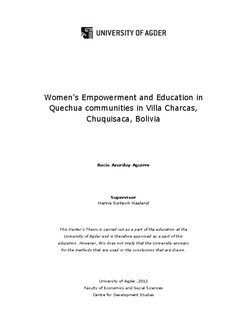Women's empowerment and education in Quechua communities in Villa Charcas, Chuquisaca, Bolivia
Master thesis
Permanent lenke
http://hdl.handle.net/11250/135251Utgivelsesdato
2012Metadata
Vis full innførselSamlinger
Sammendrag
Education and empowerment are two concepts that are interwoven in the rhetoric of
development. The main argument is that education leads to empowerment, enabling people to
take control over their own lives. This research study explores people’s perception of
education in Villa Charcas a Municipality located in Chuquisaca, Bolivia. Moreover it seeks
to find out if the gender equity transverse of the Bolivian Education Reform (ERL) of 1994
has had impact on women’s empowerment in Villa Charcas, and if the community sees as
good or bad the influence of education on women’s empowerment. The ERL has been an
attempt to change the prevailing educational model of the past by focusing its strategies on
increased awareness and respect of the different cultures that inhabit the country, respect for
the diverse languages and awareness of equal opportunities for women and men. The ERL
was the first law that arranged concrete strategies and resources to implement these aspects
and to put them into practice.
The research for this study has been carried out in Villa Charcas, a Municipality of recent
creation located in the south east of the province of Chuquisaca. It has an area of 687,598
km2 and 12.374 inhabitants from which 4.174 belong to the ten communities of this research.
There are five primary schools and one secondary school within the area of study.
One of the conclusions of this research is that education plays an essential role for Villa
Charcas’ people. The parents interviewed, men as well as women equally recognize the
importance of education for boys and girls at least until they complete the primary education.
Many parents prioritize school duties at home over daily tasks so that their children get a good
primary education. The women of Villa Charcas’ do not feel deprived of their right to
education as they would have felt a few decades before. They all know that education is free
and available and that reading and writing will offer them better work conditions if they
attend school.
In respect to the gender equity transverse of the ERL of 1994 it was revealed that there have
been favourable impacts, but not to the extent of changing radically the community’s
mentality. Even though parents and teachers in Villa Charcas confirm there have been
positive changes in education, the opinions are that there is still a long way to go. The study
revealed that teachers did not fully comprehend gender mainstreaming in order to apply the
gender transverse more effectively in the classrooms. Similarly the educational system failed
including parents as key stakeholders to promote their active participation and reinforce
gender contents and practices to influence changes at household level. In addition education
has not been capable of deepening students’ critical understanding in the sense that they
recognize gender equity or defy prevailing structures.
Despite this situation, the research indicates there has been an evident change of attitudes and
perceptions of Villa Charcas women’s lives among the adult generation (age 25 to 56) and the
young generation (age 12 to 24). While the older generation has not experienced a formal
education which they perceived as empowering during their childhood the young generation
has received gender equity education and has expanded their range of opportunities. Thus,
young women have increased their aspirations with regard to education; some of these women
complete secondary education aiming at superior education and professionalization to access
qualified work away from the field of agriculture, where most women previously have
worked. The research has also revealed that education is not the only means by which women
from Villa Charcas can overcome situations of deprivation or oppression For instance
migration has also proved to play a fundamental role in their lives and provides important
opportunities for women in terms of work and social and economic influence.
Beskrivelse
Master thesis in development management- University of Agder, 2012
